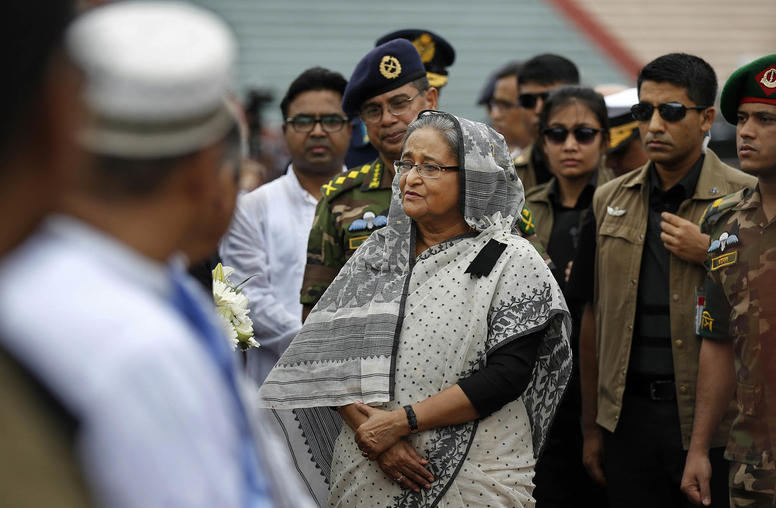Question And Answer
Publications
Articles, publications, books, tools and multimedia features from the U.S. Institute of Peace provide the latest news, analysis, research findings, practitioner guides and reports, all related to the conflict zones and issues that are at the center of the Institute’s work to prevent and reduce violent conflict.

The Persistent Challenge of Extremism in Bangladesh
On July 1, 2016, Bangladeshi militants carried out an attack, targeting mostly foreigners and non-Muslims, at the Holey Artisan Bakery in Dhaka. The Bangladeshi government responded to the attack with a concerted and controversial counterterrorism campaign. Although the number of terrorist incidents has been in steady decline since 2016, Islamist groups continue to operate, recruit, and carry out small-scale attacks while aspiring to perpetrate greater violence. This report examines the dynamics, drivers, and manifestations of extremism in Bangladesh and discusses measures to weaken its appeal.

Losing Facts to Fiction: Nationalism, Misinformation, and Conspiracy Theories in Pakistan
Misinformation and conspiracy theories have become staples of mainstream politics in numerous countries around the world—democracies and autocracies alike. Pakistan is no exception. This report examines the causes of pervasive belief in misinformation in Pakistan—particularly nationalistic misinformation—and the consequences for the country’s relations with its neighbors, the risk of international or domestic conflict, and attitudes toward Pakistan’s many ethnic minority groups. The report also discusses steps that policymakers can take to counteract misinformation.

Tamanna Salikuddin on Pakistan’s New Military Chief
General Asim Munir was appointed as the new head of Pakistan’s military this week — a position often viewed as the de facto leader of the country. Amid a fraught political environment, Munir’s “first job is going to be figuring out what the civil-military balance is in Pakistan,” says USIP’s Tamanna Salikuddin.

Andrew Scobell on China’s Zero-COVID Protests
After protests forced China to ease its zero-COVID policies, Xi Jinping will need to weigh socioeconomic stability against his authoritarian aims, says USIP’s Andrew Scobell: “You’re seeing domestically what many countries have noticed China doing beyond its borders: Being more assertive or aggressive.”

Mirna Galic on Japan’s New National Security Strategy
President Biden will meet Friday with Japanese Prime Minister Fumio Kishida amid “a really high sense of insecurity” over North Korean missile tests, says USIP’s Mirna Galic. On the agenda: Japan’s new national security strategy, which features “potential for closer cooperation and integration of U.S. and Japan operations.”

Event Extra: Afghanistan’s Media Landscape Amid Taliban Rule
Ayesha Tanzeem, the director of Voice of America’s South and Central Asia Division, explains how Afghanistan’s media landscape has changed in the last year and a half, how media organizations are fighting back and what the international community can do to help protect media freedom in Afghanistan.

Sameer Lalwani on the Future of U.S.-India Relations
The United States and India have a common cause in their tensions with China, as well as a “natural partnership” on technology investments, says USIP’s Sameer Lalwani. But India remains noncommittal when it comes to Russia’s war on Ukraine: “They’ve concluded that they need Russia to stick around.”

China and Strategic Instability in Space: Pathways to Peace in an Era of US-China Strategic Competition
Recent defense white papers published by the Chinese government refer to outer space as the “commanding heights” in international strategic competition, and the United States has explicitly identified space as a warfighting domain. While current strains in the US-China relationship have made managing potential conflict in space difficult, it is not impossible. This report identifies several areas in which the United States and China, as two of the world’s three most formidable space powers, urgently need to foster greater communication and cooperation.

Carla Freeman on U.S.-China Strategic Competition in Space
Amid a technological boom, space is becoming the latest front for U.S.-China strategic competition. And with only a handful of Cold War-era treaties governing it, the world “needs some new rules and norms to manage a very precious environment for the future,” says USIP’s Carla Freeman.

Elite Capture and Corruption of Security Sectors
The objective of US security sector assistance is to help build effective, accountable, responsive, transparent, and legitimate security sectors in partner nations to address common security risks. Such action ultimately benefits US national interests, as when the United States modernized West Germany’s military during the Cold War; when US security sector support to South Korea helped the United States deter regional threats; and when, in Ukraine, US security sector assistance contributed to success in fending off Russian aggression in 2022. Similarly, the United States helped Georgia turn its traffic police into one of the most trusted institutions in the country, supported Albania as it updated the governance of its security forces, and assisted Colombia in making progress toward ending its long-standing armed conflict.